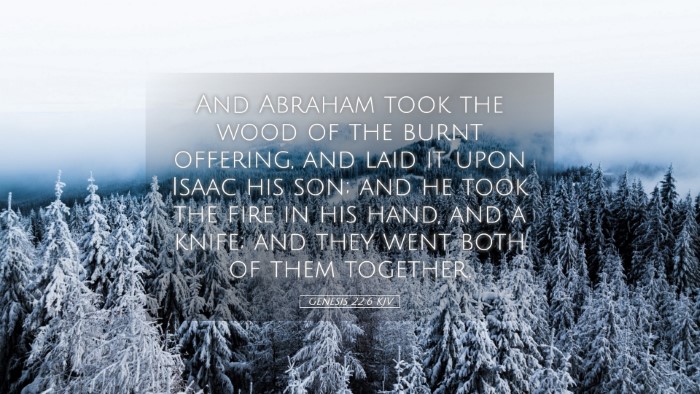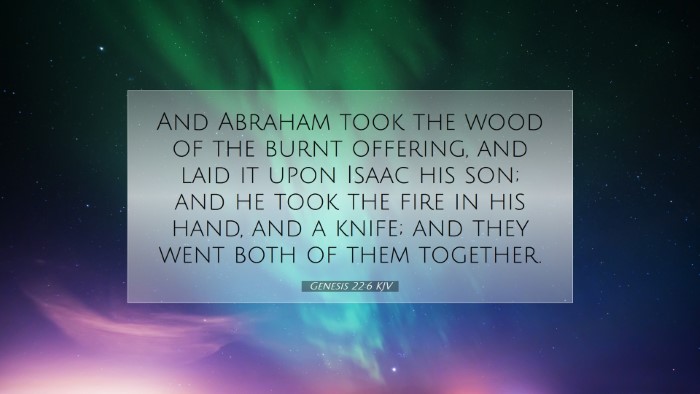Commentary on Genesis 22:6
Verse Reference: Genesis 22:6 - "So Abraham took the wood of the burnt offering and laid it on Isaac his son. And he took in his hand the fire and the knife. So they went both of them together."
Introduction
The passage of Genesis 22:6 marks a profound moment in biblical history as it describes the essential obedience of Abraham in his test of faith. This commentary synthesizes insights from esteemed scholars, highlighting the theological richness and practical implications of this verse.
Contextual Analysis
This narrative occurs in a key chapter often referred to as the Akedah, or "the binding of Isaac." This story not only illustrates Abraham's faith but also foreshadows the sacrifice of Christ, establishing the significance of obedience and trust in God’s plans. In this context, the actions of Abraham and Isaac can be viewed through multiple theological lenses.
Abraham's Obedience
Matthew Henry emphasizes that Abraham's complete obedience demonstrates his unwavering faith in God. When commanded to sacrifice Isaac, Abraham did not hesitate but obediently prepared for the act, illustrating the depths of his conviction and trust in God’s promises.
Isaac’s Role
Isaac’s submission to his father is noteworthy. Albert Barnes comments on Isaac's age, suggesting he was likely a young man capable of resisting this act yet willingly followed Abraham, symbolizing his faith and trust in both God and his father. This duality of obedience points to a larger narrative of submission to divine will.
The Symbolism of the Elements
In this verse, the elements of the sacrifice—wood, fire, and knife—carry substantial symbolic weight. Each represents essential components of faith and sacrifice.
- Wood: Represents the burden of sacrifice, paralleling the cross of Christ with the wood laid upon Isaac's shoulders.
- Fire: Symbolizes divine judgment and the purification process, highlighting the seriousness of the act of sacrifice.
- Knife: Represents the means through which the sacrifice is executed, pointing to the finality of obeying God's commands.
Theological Implications
Adam Clarke highlights the theological significance of Abraham’s test, which not only tested his faith but also his relationship with God. It reveals that true faith involves the willingness to surrender even the most cherished aspects of one’s life to God. This resonates with Jesus’ command to take up one’s cross and follow Him.
Foreshadowing Christ
The account of Abraham and Isaac foreshadows the ultimate sacrifice of Christ. The similarity in the elements of the narrative—wood, the submissive son, and the act of sacrifice—points theology towards the New Testament. Just as Abraham did not withhold his son, God did not withhold His Son for the sake of humanity.
Application for Believers
The events of Genesis 22:6 provide a template for faith-filled living. Believers today can draw several key applications from this narrative:
- Trust in God’s Plans: Just as Abraham trusted in God when commanded to sacrifice Isaac, Christians are called to trust God’s plans in their lives, even when they do not understand them.
- Willingness to Sacrifice: The lesson of being willing to give up what we hold dear for God’s calling remains relevant. It requires a heart aligned with God’s will.
- Obedience: This passage underscores that true faith results in action. Believers are reminded that faith without works is dead, echoing the sentiments expressed by James in the New Testament.
Conclusion
Genesis 22:6 encapsulates profound themes of faith, obedience, and sacrifice. The works of Matthew Henry, Albert Barnes, and Adam Clarke combine to provide a holistic understanding of this text, illustrating its relevance in both historical and contemporary contexts. Pastors, students, theologians, and Bible scholars can draw from these insights to deepen their understanding of the nature of God’s demands and the call to faithful action in response to His promises.


